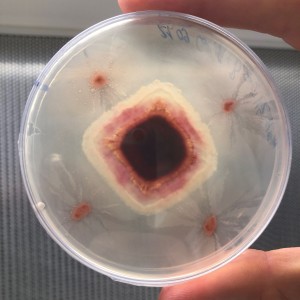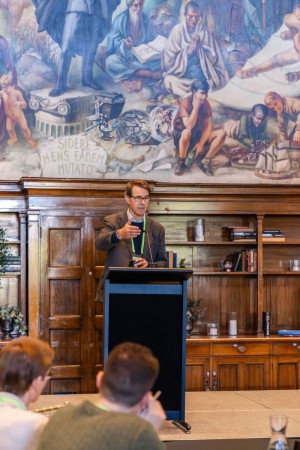Beyond Myrtle Rust represents at the NZ Microbiological Society Conference
The New Zealand Microbiology Society conference promised to be an exciting event, showcasing the latest advances in microbiology research and technology. The event stayed true to the promise, delivering an array of talks from scientists, researchers, and academics who shared their insights and knowledge on various topics related to microbiology. Attendees had plenty of opportunities to engage in lively discussions, network with colleagues and forge new connections.

Vlad holding one of many petri dishes used for his research.
One attendee was Beyond Myrtle Rust’s own Vladislav Kholostiakov. Vlad presented recent findings from his PhD research in a talk titled “Variation in seed-borne microbial communities of Metrosideros excelsa with consequences for germination success.” Our programme leader, Mahajabeen (Maj) Padamsee, also presented – for her talk, she discussed how the soil microbial community associated with Lophomyrtus bullata responds to myrtle rust disease.
“Researchers were interested to learn about Austropuccinia psidii, which causes myrtle rust disease, and had many questions about the pathogen, such as why it only infects immature tissue,” says Maj.
Beyond Myrtle Rust also sponsored Invited Speaker in Plant Pathology – Australia, Professor Robert Park. Robert has a PhD in plant pathology and has conducted research in the pathology and genetics of cereal rust diseases for the past 38 years. His work has been extensively recognized via research awards, such as Germany’s Alexander von Humboldt research award and the USA’s Fulbright Senior Scholarship. In recognition of his work in China, he received the Friendship Award of China in 2009 - the highest honour the Chinese Government bestows on foreign experts for outstanding contributions to China. He is also a Fellow of the Royal Society of New South Wales and the Australian Academy of Technological Sciences and Engineering (2015), a Fellow of the Royal Society of New South Wales (2019), and a Fellow of the Australasian Plant Pathology Society (2019).

Professor Robert Park speaking at the Australasian Myrtle Rust Conference. Photo credit: AMRC 2023
Generally, Robert’s work in plant pathology has the potential to inform work on myrtle rust. However, at a recent talk Robert delivered at the Australasian Myrtle Rust Conference (AMRC) in June 2023, he revealed a deeper connection with myrtle rust. His journey with plant pathology actually started 45 years ago, not working in agriculture but in forestry. He completed his honours and PhD on some foliar pathogens of Eucalyptus.
Even now, Robert supports our forests and the myrtle rust community by lending his knowledge of cereal rust incursions.
“We’ve got very good understanding of these pathogens in Australia in the context of exotic incursions so they provide very good examples that can be used and applied to other systems like myrtle rust,” Robert said in his talk for AMRC.
For the New Zealand Microbiology Society conference, Robert delivered a talk titled “Long-term continental surveillance and integrated rust genomics underpin sustained cereal rust control in Australia.”
“Robert’s talk highlighted the importance of systematic surveys and a long-term collection of rust fungal spores, especially A. psidii, in New Zealand,” says Maj.
